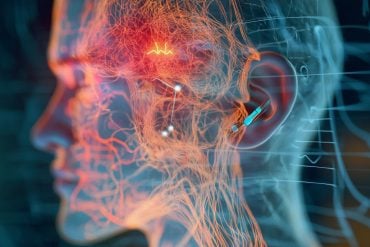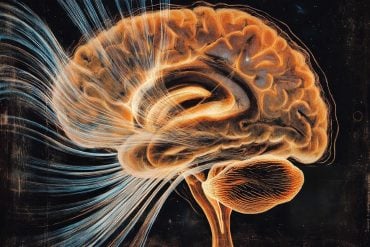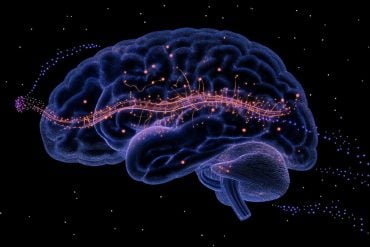Summary: A new study identifies a specific gene that regulates neural progenitor cell proliferation in response to lithium for those with bipolar depression.
Source: Elsevier
Bipolar disorder, a neuropsychiatric condition that includes manic and depressive episodes, affects about 1% of the population and is strongly influenced by genetics.
About half of patients respond very well to lithium salts as a therapy, and treatment responsiveness also depends on genetics.
Researchers still have little idea of how lithium works to stabilize mood, but, similar to other anti-depressants, it stimulates proliferation of adult neural progenitor cells (NPC), perhaps leading to the birth of new neurons.
Now, a new study identifies a specific gene that seems to regulate NPC proliferation in response to lithium.
The study, led by Jason Stein, PhD, at The University of North Carolina at Chapel Hill, appears in Biological Psychiatry, published by Elsevier.
“Some people with bipolar disorder show therapeutic responses to lithium, while others do not,” said Dr. Stein. “Previous studies have identified a limited number of genetic variations contributing to lithium’s clinical outcomes. These studies are incredibly important, but are also costly, require large sample sizes, and do not identify cell types or biological processes mediating genetic effects.
“Here, we took an alternative approach by performing a genome-wide association study (GWAS) in a cell culture system from multiple human donors, either exposed to or not exposed to lithium.”
To measure lithium-induced neural proliferation, the researchers employed a cell culture of human NPCs obtained from fetal brain tissue. Some cultures were exposed to lithium, which increased cell proliferation, whereas other cultures were not. The authors then performed GWAS tests.
“Our cell-culture based GWAS approach identified genetic variation as well as a specific gene that influenced lithium-responsive neural progenitor proliferation,” said Dr. Stein.
John Krystal, MD, editor of Biological Psychiatry, said of the study, “The efficacy of lithium remains one of the great mysteries in psychiatry. Emerging from an accidental discovery, it remains a wonder drug for many patients.

“This study identifies mechanisms underlying the ability of lithium to stimulate proliferation of neural progenitor cells. In particular, they implicate chromosome 3p21.1 and the guanine nucleotide-binding protein-like 3 (GNL3) gene in this effect. GNL3 has been implicated previously in cell cycle regulation and cellular differentiation.”
GNL3 has also been implicated in risk for bipolar disorder, schizophrenia and inter-individual variations in intelligence, suggesting the gene plays an important role in brain function.
Using CRISPR technology, the researchers then increased expression of GNL3 in the cultures, which in turn increased neural proliferation in response to lithium. Conversely, decreasing expression of GNL3 decreased lithium-induced proliferation.
“Though more experiments are required to determine if these results have clinical potential, this study opens up a new approach of identifying pharmacogenomic effects in cell culture systems,” added Dr. Stein.
About this psychopharmacology research news
Author: Eileen Leahy
Source: Elsevier
Contact: Eileen Leahy – Elsevier
Image: The image is in the public domain
Original Research: Open access.
“Cellular genome-wide association study identifies common genetic variation influencing lithium induced neural progenitor proliferation” by Jason L. Stein. Biological Psychiatry
Abstract
Cellular genome-wide association study identifies common genetic variation influencing lithium induced neural progenitor proliferation
Background
Bipolar disorder (BD) is a highly heritable neuropsychiatric condition affecting more than 1% of the human population. Lithium salts are commonly prescribed as a mood stabilizer for individuals with BD. Lithium is clinically effective in roughly half of treated individuals, where genetic background is known to influence treatment outcomes. While the mechanism of lithium’s therapeutic action is unclear, it stimulates adult neural progenitor cell (NPC) proliferation, similar to some antidepressant drugs.
Methods
To identify common genetic variants that modulate lithium-induced proliferation, we conducted an EdU-incorporation assay in a library of 80 genotyped human NPCs treated with lithium. This data was used to perform a genome-wide association study (GWAS) to identify common genetic variants that influence lithium induced NPC proliferation. We manipulated expression of a putatively causal gene using CRISPRi/a constructs to experimentally verify lithium induced proliferation effects.
Results
We identified a locus on chr3p21.1 associated with lithium-induced proliferation. This locus is also associated with BD risk, schizophrenia risk, and inter-individual differences in intelligence. We identified a single gene, GNL3, whose expression temporally increased following lithium in an allele-specific fashion. Experimentally increasing expression of GNL3 led to increased proliferation under baseline conditions, while experimentally decreasing GNL3 expression suppressed lithium induced proliferation.
Conclusions
Our experiments reveal that common genetic variation modulates lithium induced neural progenitor proliferation and that GNL3 expression is necessary for lithium’s full proliferation-stimulating effects. These results suggest that performing genome wide associations in genetically diverse human cell lines is a useful approach to discover context specific pharmacogenomic effects.







